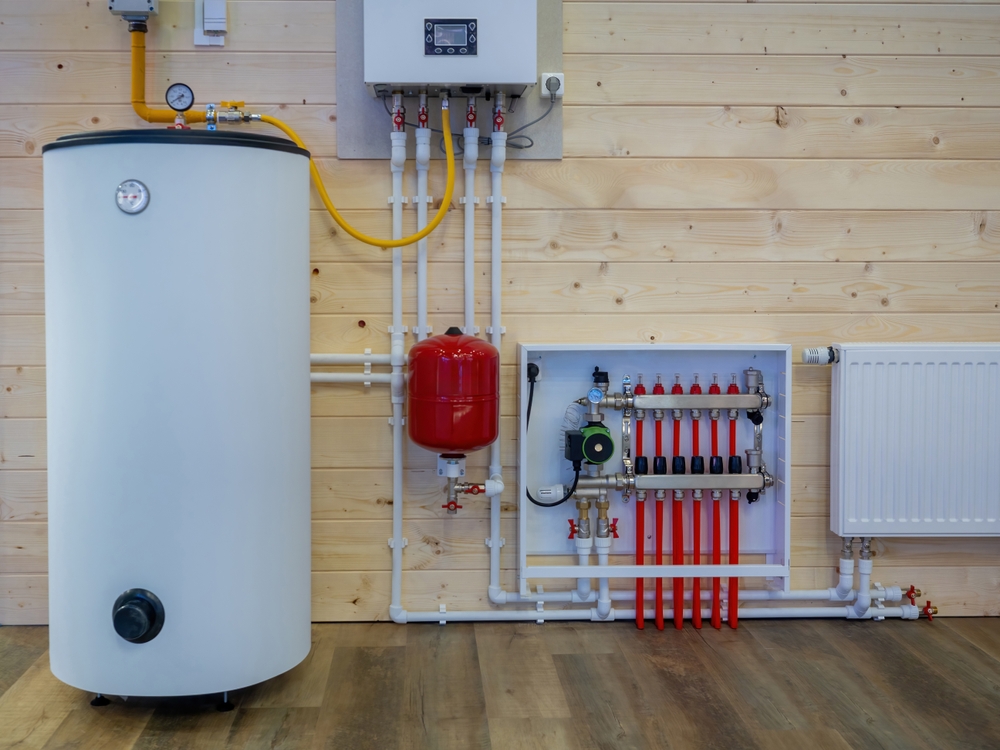When it comes to heating your home, you have more options than just forced-air systems. In fact, many homeowners are discovering a superior way to achieve ultimate comfort and efficiency: hydronic heating.
Instead of pushing hot air through ducts, a hydronic system circulates hot water through a closed loop of pipes, delivering heat to various parts of your house. The radiant heat that’s produced feels natural and enveloping, much like the warmth from the sun. With a hydronic heating system, you don’t have to put up with noisy blowers kicking on and off, drafts, or hot and cold spots; you simply achieve the ideal comfort for your living space.
Are you feeling intrigued? Let’s take a closer look at the many benefits of hydronic heat pumps and boilers.
How Hydronic Heating Works
The process starts with a heat source, typically a boiler or a heat pump, which heats the water. This heated water is then pumped through a network of tubing installed under your floors, within your walls, or to radiators or baseboard heaters. As the water flows through these pipes, it radiates heat outward. After the water releases its heat, it circulates back to the heat source to be reheated, and the cycle continues.
Why Homeowners Love Hydronic Heating Systems
Homeowners gravitate to hydronic heating for three big reasons: comfort, efficiency, and performance. Add the flexibility to zone rooms individually and the ability to keep indoor air cleaner, and it’s easy to see why hydronic systems have become a favorite among families in Baltimore, MD, and beyond.
Superior Comfort and Consistent Heat
Hydronic systems deliver a quality of heat that is second to none. Thanks to radiant floors and panel radiators, rooms are heated more gently and consistently. This eliminates the hot and cold spots commonly associated with forced-air systems and even allows you to lower thermostat settings — often by 1-3°F — without sacrificing comfort.
Unmatched Energy Efficiency
One of the most significant benefits of hydronic heating systems is their exceptional energy efficiency. Water is a far better medium for transferring and holding heat than air. Because of this, hydronic systems don’t have to work as hard or as often to maintain your desired temperature.
Additionally, hydronic systems do not lose heated air through ductwork like forced-air systems do. This means they experience minimal heat loss as the water travels from the boiler to the radiators or radiant flooring. Ultimately, the efficient operation of a hydronic heater translates directly into lower energy bills.
Whisper-Quiet Operation
While many can get used to it, for others, the constant hum and whoosh of a furnace kicking on and off can be disruptive, especially if they are trying to sleep, watch a movie, or simply enjoy a quiet evening. This brings us to another point about hydronic heating systems: they are virtually silent. You don’t have to listen to a blower running or air blowing through the ductwork.
You might hear a brief circulator hum during startup or a soft tick as pipes expand, but day to day, the system fades into the background. That’s a big quality-of-life upgrade if you work from home, have light sleepers in the house, or just prefer a peaceful environment.
Incredible Versatility and Durability
Hydronic systems are incredibly versatile because the hot water they produce can be used for more than just heating a space. It can also be set up to heat your hot water supply for cooking, bathing, and more.
Their versatility isn’t the only thing to note about boilers. They also have an incredibly long lifespan, with most lasting 20 years or more with proper maintenance. This makes a hydronic system a sound long-term investment in your property.
Room-by-Room Zoning
Hydronic systems are naturally suited to zoning. This simply means that, with separate thermostats, each zone can be managed independently. For example, you can keep the nursery a few degrees warmer than the rest of the house, keep seldom-used rooms cooler, or heat the master bath just the way you like it. Overall, the ability to zone your home helps you save energy and reduce thermostat wars.
Improved Indoor Air Quality
For families with allergies, asthma, or other respiratory sensitivities, indoor air quality is a major concern. Because of this, they may not feel inclined to use forced-air systems, which can be a primary culprit in circulating dust, pollen, pet dander, and other allergens throughout the home. The ductwork itself can even become a breeding ground for mold and bacteria if not meticulously maintained.
Hydronic systems, on the other hand, heat living spaces without stirring up airborne particles. This keeps the air in your home fresher and healthier. It can even provide the welcome relief your family needs from persistent allergies.
The Rise of the Hydronic Heat Pump
While traditional boilers are a fantastic heat source for hydronic systems, an even more efficient and environmentally friendly option is emerging: the hydronic heat pump, also known as an air-to-water heat pump. These devices don’t create heat by burning fuel; instead, they extract ambient heat from the outside air (even in cold weather) and transfer it into the water circulating through your hydronic system. Many air-to-water heat pumps can even reverse their operation to provide chilled water for cooling or hot water for cooking, appliance use, showering, and more.
Install or Service a Hydronic Heating System Today
If you’re ready to explore the benefits of hydronic heating for your own home, our team of expert plumbers is here to help. At Saffer Plumbing, we specialize in the design, installation, and servicing of state-of-the-art boiler systems. We can help you determine the perfect setup for your needs and ensure it’s running at peak performance for years to come.
Contact us today to schedule a service and let our plumbing installation experts keep your home comfortable with the right hydronic heat pump or boiler.

